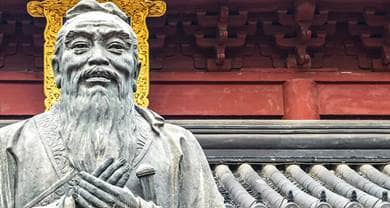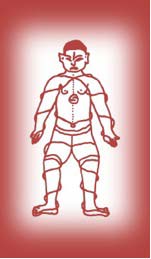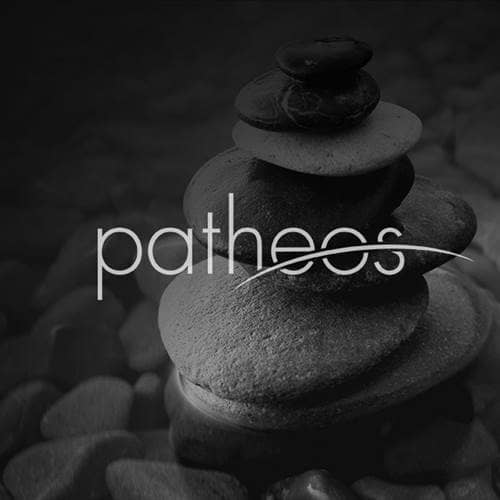- Trending:
- Pope Leo Xiv
- |
- Israel
- |
- Trump
- |
- Social Justice
- |
- Peace
- |
- Love

RELIGION LIBRARY
Confucianism
Suffering and the Problem of Evil
According to some interpretations of Confucianism, suffering and evil are inevitable in human life, and can promote learning and growth. A mistake is not a "sin," but an opportunity to learn and do better next time. Empathy for the suffering of others also provides motivation to grow morally, but not all humans are capable of empathy. The most influential Confucian reflections on suffering and the problem of evil come from Mengzi and those who sustained Mengzi's tradition, such as Zhu Xi and Wang Yangming.
 Unlike Kongzi, who seems to have found both personal support and sanction as well as anxiety in the moral, yet unpredictable power known as Tian, Mengzi's faith in Tian as the ultimate source of legitimate moral and political authority appears to have been unshakeable. Like Kongzi, he says that "Tian does not speak -- it simply reveals through deeds and affairs" (Mengzi 5A5). He ascribes the virtues of ren (co-humanity), yi (rightness), li (ritual propriety), zhi (wisdom), and sheng (sagehood) to Tian (Mengzi 7B24) and explicitly compares the rule of the moral king to the rule of Tian (Mengzi 5A4). When human beings fail to behave morally or put Tian's moral will into practice, this does not convince Mengzi that Tian is weak or amoral. Rather, for Mengzi, moral failure and even great evils are reminders of how important human beings are in the moral scheme of the universe. Earthquakes become opportunities to scrutinize the moral dealings of one's rulers; famines become pretexts for political dissent and even regime change.
Unlike Kongzi, who seems to have found both personal support and sanction as well as anxiety in the moral, yet unpredictable power known as Tian, Mengzi's faith in Tian as the ultimate source of legitimate moral and political authority appears to have been unshakeable. Like Kongzi, he says that "Tian does not speak -- it simply reveals through deeds and affairs" (Mengzi 5A5). He ascribes the virtues of ren (co-humanity), yi (rightness), li (ritual propriety), zhi (wisdom), and sheng (sagehood) to Tian (Mengzi 7B24) and explicitly compares the rule of the moral king to the rule of Tian (Mengzi 5A4). When human beings fail to behave morally or put Tian's moral will into practice, this does not convince Mengzi that Tian is weak or amoral. Rather, for Mengzi, moral failure and even great evils are reminders of how important human beings are in the moral scheme of the universe. Earthquakes become opportunities to scrutinize the moral dealings of one's rulers; famines become pretexts for political dissent and even regime change.
The dependence of Tian upon human agents to put its will into practice helps account for the emphasis Mengzi places on the satisfaction of the people as an indicator of the ruler's moral right to power, and on the responsibility of morally-minded ministers to depose an unworthy ruler. In a dialogue with King Xuan of Qi (r. 319-301 B.C.E.), Mengzi says:
The people are to be valued most, the altars of the grain and the land [traditional symbols of the vitality of the state] next, the ruler least. Hence winning the favor of the common people you become Emperor.... (Mengzi 7B14)
When the ruler makes a serious mistake they admonish. If after repeated admonishments he still will not listen, they depose him.... Do not think it strange, Your Majesty. Your Majesty asked his servant a question, and his servant dares not fail to answer it directly. (Mengzi 5B9)
When the king asks whether it is true that various sage kings (Tang and Wu) rebelled against and murdered their predecessors (Jie and Zhou), Mengzi answers that it is true. The king then asks:
"Is it permissible for a vassal to murder his lord?"
Mengzi replied, "One who robs co-humanity [ren] you call a `robber'; one who robs the right [yi] you call a `wrecker'; and one who robs and wrecks you call an `outlaw.' I have heard that [Wu] punished the outlaw Zhou -- I have not heard that he murdered his lord (Mengzi 1B8).
In other words, Wu was morally justified in executing Zhou, because Zhou had proven himself to be unworthy of the throne through his offenses against ren and yi -- the very qualities associated with the Confucian exemplar (junzi) and his actions. While Mengzi endorses a "right of revolution," he is no democrat. His ideal ruler is the sage-king, such as the legendary Shun, on whose reign both divine sanction and popular approval conferred legitimacy:
When he was put in charge of sacrifices, the hundred gods delighted in them which is Tian accepting him. When he was put in charge of affairs, the affairs were in order and the people satisfied with him, which is the people accepting him. Tian gave it [the state] to him; human beings gave it to him. (Mengzi 5A5)
Mengzi is committed to a type of benevolent dictatorship, which puts moral value before pragmatic value and in this way seeks to benefit both ruler and subjects. The sage-kings of antiquity are a model, but one cannot simply adopt their customs and institutions and expect to govern effectively (Mengzi 4A1). Instead, one must emulate the sage-kings both in terms of outer structures (good laws, wise policies, correct rituals) and in terms of inner motivations (placing ren and yi first). Like Kongzi, Mengzi places an enormous amount of confidence in the capacity of the ordinary person to respond to an extraordinary ruler, so as to put the world in order. Almost all later Confucians share this view that successes (or failures) of human capacity and agency deserve the credit (or blame) for the moral state of our world. In this sense, for Confucian thinkers, evil has no existence or reality independent from goodness; it is defined as the absence of goodness, and more specifically, as the failure of human beings to cultivate their innate goodness and put it into practice in the world.
Study Questions:
1. Do Confucians believe that evil exists?
2. What kinds of suffering or evil are most troubling to Confucians?
3. What is the meaning of suffering for Confucians?










